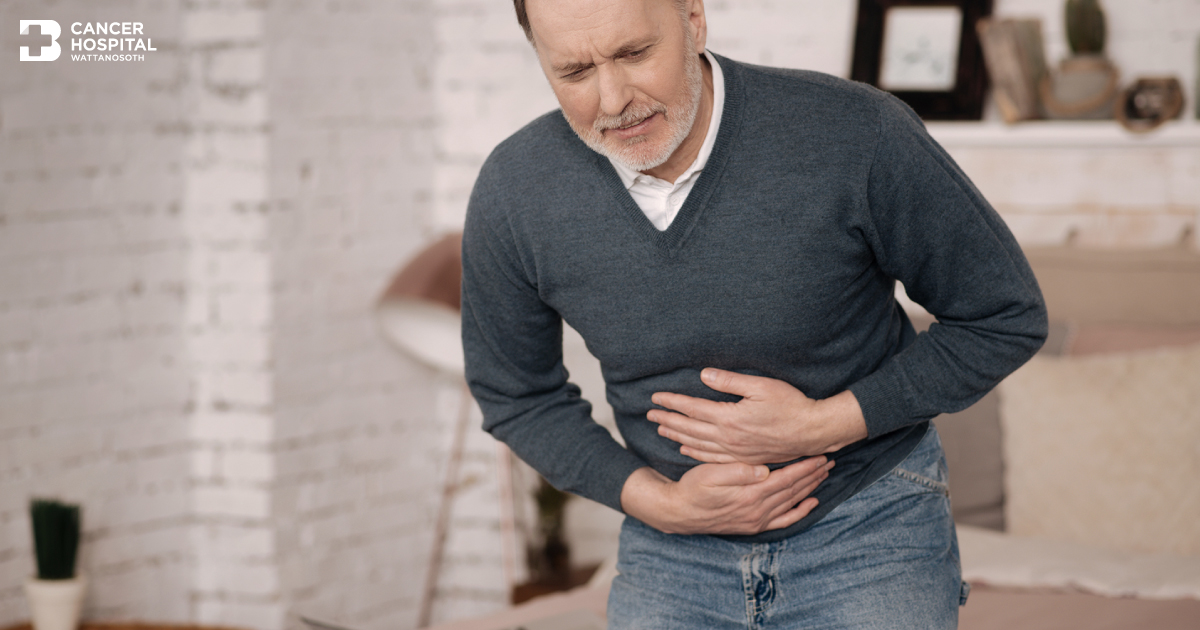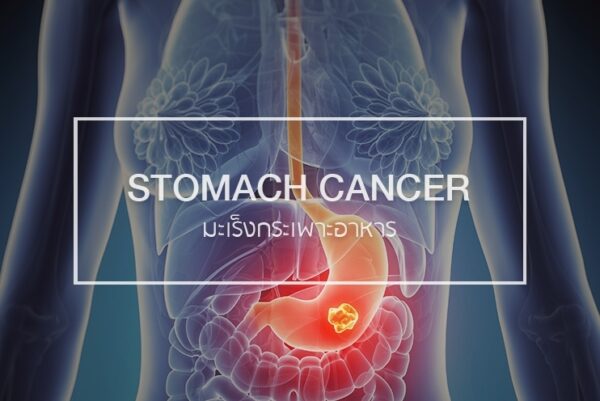
Avoid Risks of Gastric Cancer
One of the top ten cancers that affects Thais is gastric or stomach cancer, which GLOBOCAN 2020 ranked as the fourth highest cancer-related deaths worldwide and the fifth highest incidence of all cancer. It affects men more than women and are often discovered in people over the age of 40. Therefore, regular checkups, observing warning signs and understanding gastric cancer are important.
Getting to Know Gastric Cancer
The stomach is part of the digestive system that digests food and absorbs nutrients before food is moved into the intestines. Gastric cancer arises from the cells lining the stomach and can spread through to the outer layer. Because the stomach is composed of several layers of tissue, such as the mucosa, muscles, and other connective tissues, cancer can evolve from various factors and causes.
Culprits That Cause Gastric Cancer
Culprits that can cause gastric cancer are
- Helicobacter Pylori infection. H. pylori is a bacteria that can release toxins in the stomach that cause ulcers in the stomach and intestines These inflammations can transform infected cells into cancer.
- Chronic gastritis from diets that contain
- Polycyclic aromatic hydrocarbon (PAH), which is a carcinogen commonly found in BBQ or smoked food
- Polar compounds from food fried in reused oil
- Acrylamide from fried, crispy, or grilled food
- Nitrosamines from fermented food, canned food, grilled, BBQ, or salty food
- Heterocyclic Amines (HCAs) from overcooked meat increase the risk of gastric cancer. The formation of HCAs is dependent on the amount of heat used to cook.
- Age – as we age, the risk of gastric cancer increases
- Gender – men have higher risk than women
- Cigarette smoking and alcohol consumption increases the risk of gastric cancer
- Ethnicity – Asians are more affected than Westerners, particularly, Japanese, Chinese, and Koreans
- Gastrointestinal stromal tumors can develop from unknown cause
- Genetics – family history of gastric cancer increases the risk by as high as70%
- People with group A blood type has 20% higher risk than other groups.
- Patients who had previous gastric surgery.
Symptoms of Gastric Cancer
Gastric cancer patients tend to get diagnosed with advanced stage cancer since symptoms will not show in the early stages.
Symptoms in early stages include:
- Indigestion
- Abdominal discomfort
- Bloating
- Heartburn
- Nausea
- Loss of appetite
- Weight loss
- Burning sensation like gastric reflux
Symptoms in advanced stages gastric cancer include:
- Dark color stool
- Bloody stool
- Stomach pain
- Vomiting blood
- Weight loss of unknown cause
- Jaundice (skin and eyes)
- Left supraclavicular lymph node enlargement
- Development of fluid in the abdomen

Diagnosis
Diagnosis of gastric cancer can be assessed by
- Family history and physical examination for masses in the abdomen or supraclavicular lymph nodes
- Clinical lab tests, such as blood tests, liver function tests, etc.
- Double-contrast barium swallow to assess the gastrointestinal tract.
- Esophago-gastro-duodenoscope (EGD) is recommended to view the entire digestives tract. Any abnormality can be observed and biopsy can be taken for clinical diagnosis, which is 95% successful in finding cancer cells.
- Endoscopic Ultrasonography (EUS) can help to visualize the different layers of the stomach lining and determine the depth of tissue involvement.
- Computed Tomography (CT) of the abdomen can image the pathophysiology of the stomach and surrounding lymph nodes to assess the involvement of other abdominal tissues.
- PET/CT scan can ascertain whether the bones and lungs are involved or not.
- H. pylori infection diagnosis via urea breath test, blood test, or antibody test.
Treatment of Gastric Cancer
In the initial stages when symptoms seem like ulcers, the doctor may prescribe antibiotics. If the symptom does not improve within 2 weeks or worsen after 6 – 8 weeks of treatment, endoscopy may be necessary for the next treatment option.
Early stage of cancer tends to stay in the mucous lining and can be removed by endoscopy. The surgeon may remove the cancerous portion and the surrounding affected lymph nodes. Next, chemotherapy can be administered to get rid of any lingering cancer cells or stop the spread to other sites.
Advanced stage of gastric cancer can be treated with chemotherapy in combination with radiation therapy in some cases where complications arise from surgery, such as blockage of the biliary duct. At this stage, 2 out of 3 patients who were treated with surgery alone may have recurrence and spread to the lymph nodes. Some may have recurrence and metastasis to other organs.
Close follow up after treatment is quite important because if there is recurrence, it can be caught and treated in time. Thus, patients should always come for their follow up.
Gastric Cancer Prevention
- Eat warm food and use serving spoons when sharing meals every time
- Include fruits and vegetables in half of each meal portion
- Avoid grilled, BBQ, fermented food, salty food and greasy food
- Exercise regularly
- Avoid cigarette smoking and alcohol consumption
- Get gastric cancer screening endoscopy when over the age of 40
- If there is family history of gastric cancer, regularly screening endoscopy and H. pylori infection test should be considered.
In any case, if gastric cancer is detected early, there is a chance for a cure. However, most people are diagnosed once the cancer has advanced. Therefore, routine annual checkup and screening for gastric cancer at the right age, watchful self-surveillance, and taking care of your health are ways to prevent gastric cancer in the long run.